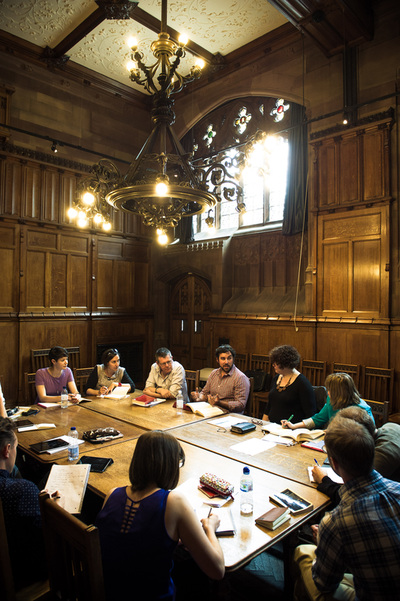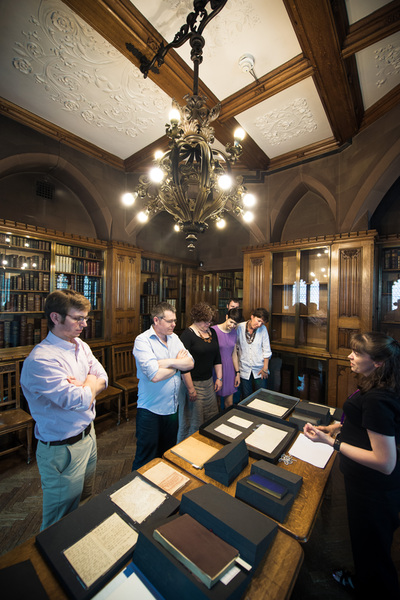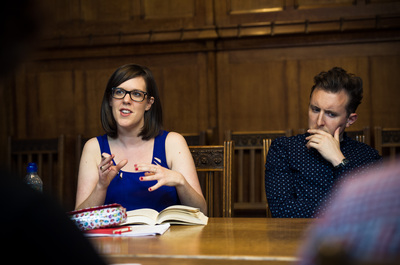Images courtesy of The University of Manchester. Photos: Ant Clausen (www.antclausen.com)
Inaugural Reading Group: “Archival Pleasures”
University of Manchester, John Rylands Library
13 June 2014
Readings:
> Elizabeth Stoddard, The Morgesons (1862)
> Carrie Hyde and Joseph Rezak, “The Aesthetics of Archival Evidence” J19: The Journal of Nineteenth-Century Americanists 2.1 (Spring 2014): 155-62.
> Britt Rusert, “The Science of Freedom: Counter-Archives of Racial Science on the Antebellum Stage,” African American Review 45.3 (Fall 2012): 291-308.
> Ellen Gruber Garvey, “Nineteenth-Century Abolitionists and the Databases They Created.” Legacy: A Journal of American Women Writers 27. 2 (2010): 357-366.
> Christopher Looby, “Sexuality, History, Difficulty, Pleasure,” J19: The Journal of Nineteenth-Century Americanists 1.2 (Fall 2013): 253-258.
In his recent ALH piece entitled “The Literariness of Sexuality: Or, How to Do the (Literary) History of (American) Sexuality,” Christopher Looby examines the micropolitics of sensation in the long nineteenth century and suggests that “sexuality is essentially a literary phenomenon.” To that end, his talk at BrANCA’s inaugural symposium argued that Elizabeth Stoddard’s 1862 novel The Morgesons might best be read as “an index of the moment when heterosexuality was just another depraved sensory experience rather than the normative condition.” In light of this provocation to rethink the literary life of sensory pleasure, BrANCA’s inaugural reading group turned to the question (and the matter) of “archival pleasures” in three senses: the tactile encounter with archival texts by way of curated tours of selected 19th-century Americanist printed and manuscript materials from John Rylands Library’s Special Collections, the sensory experiences archived in but also reconstituted by 19th-century American literature, and, finally, the ways that recent scholarship on archival evidence, counter-archives, and old/new media invites us to reconsider at once the delights and the methods of archival inquiry.
Fran Baker, an archivist at the John Rylands Library and one of our hosts for the afternoon, has written a blog post about the event which you can read here and Hannah Murray, one of the attendees, has written a report on the event for US Studies Online which you can read here.
University of Manchester, John Rylands Library
13 June 2014
Readings:
> Elizabeth Stoddard, The Morgesons (1862)
> Carrie Hyde and Joseph Rezak, “The Aesthetics of Archival Evidence” J19: The Journal of Nineteenth-Century Americanists 2.1 (Spring 2014): 155-62.
> Britt Rusert, “The Science of Freedom: Counter-Archives of Racial Science on the Antebellum Stage,” African American Review 45.3 (Fall 2012): 291-308.
> Ellen Gruber Garvey, “Nineteenth-Century Abolitionists and the Databases They Created.” Legacy: A Journal of American Women Writers 27. 2 (2010): 357-366.
> Christopher Looby, “Sexuality, History, Difficulty, Pleasure,” J19: The Journal of Nineteenth-Century Americanists 1.2 (Fall 2013): 253-258.
In his recent ALH piece entitled “The Literariness of Sexuality: Or, How to Do the (Literary) History of (American) Sexuality,” Christopher Looby examines the micropolitics of sensation in the long nineteenth century and suggests that “sexuality is essentially a literary phenomenon.” To that end, his talk at BrANCA’s inaugural symposium argued that Elizabeth Stoddard’s 1862 novel The Morgesons might best be read as “an index of the moment when heterosexuality was just another depraved sensory experience rather than the normative condition.” In light of this provocation to rethink the literary life of sensory pleasure, BrANCA’s inaugural reading group turned to the question (and the matter) of “archival pleasures” in three senses: the tactile encounter with archival texts by way of curated tours of selected 19th-century Americanist printed and manuscript materials from John Rylands Library’s Special Collections, the sensory experiences archived in but also reconstituted by 19th-century American literature, and, finally, the ways that recent scholarship on archival evidence, counter-archives, and old/new media invites us to reconsider at once the delights and the methods of archival inquiry.
Fran Baker, an archivist at the John Rylands Library and one of our hosts for the afternoon, has written a blog post about the event which you can read here and Hannah Murray, one of the attendees, has written a report on the event for US Studies Online which you can read here.




